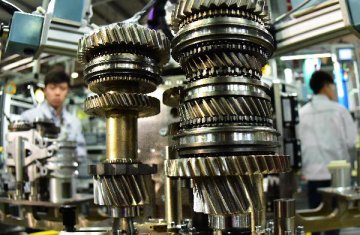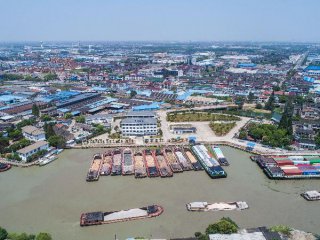Amcor (AMC):
Amcor chief executive Ron Delia says the packaging giant will be untroubled by the structural shifts in e-commerce as online giants such as Amazon upend traditional business models, with demand rising for ‘‘smart’’ packaging. He emphasised Amcor was strongly positioned to maintain a 10 to 15 per cent increase in annual returns even in a world where economic growth was struggling. ‘‘There’s not a lot of growth out there anywhere,’’ he said Deutsche Bank analyst Mark Wilson said on Tuesday the Amcor financial results were broadly in line with expectations, already ‘‘quite low’’ because of competitor and customer reports. He said there was good underlying earnings growth in both flexible and rigid packaging, and he had a ‘‘buy’’ rating on Amcor and a 12-month price target of $17.90 on the stock. Amcor shares have been steady over the past 12 months and gained 0.75 per cent to $16.12 on Tuesday.
BHP Billiton Limited (BHP):
While its headline profit fell disconcertingly short of market expectations, BHP Billiton sits ever more certainly on track to become the efficient, post-boom cash machine that Andrew Mackenzie set out to create more than four years ago. Debt reduction was one of the most important zones of BHP overreach in 2017. So was free cash flow generation. The business threw off $US12.3 billion of free cash and some $US9.8 billion of that was allocated to debt reduction. That free cash generation is the second highest on record and the debt reduction was leagues ahead of anticipation. By the June close, BHP’s net debt stood at $US16.3 billion and it now sits tantalisingly close to management long-term debt target range of $US10 billion to $US15 billion. BHP should be within its debt targets at some point in the first half of the current financial year. And it says, commodity prices willing, that as much as $US7 billion could be thrown at dividends and capital management by year’s end. Mackenzie has finally ended three years of public equivocation about BHP’s future in the US onshore petroleum business. After delivering a five-fold increase in underlying profit for 2016-17, chief executive Andrew Mackenzie said further cost cuts and stronger than expected commodity prices would help BHP generate about $US10 billion of free cash flow in fiscal 2018, based on current prices.
Commonwealth Bank of Australia (CBA):
AIA Group has withdrawn from ANZ Banking Group’s auction of its $5 billion-odd wealth business. This column flagged that CBA and ANZ were going head-to-head in their divestments after revealing that indicative bids for the former’s life arm had already been received. JPMorganadvised CBA is gunning hard to get its life insurance sale done ahead of ANZ’s wealth process and has set its final bid date accordingly. Final offers are due in to CBA by the end of the month, about two weeks ahead of ANZ’s own deadline.
Corporate Travel Management Limited (CTD):
The boss of Corporate Travel Management has no problem with hedge funds targeting the company, but says claims that the business is reliant upon acquisitions for growth are untrue. Shares of Corporate Travel fell $1.25, or 5.4 per cent, to $21.85 on Tuesday following the company’s fullyear results. It was the biggest fall since September 2015. It just exceeded 2016-17 guidance with underlying earnings of $98.6 million, up 43 per cent, versus its forecast for ‘‘slightly above’’ $97 million. Net profit rose 29 per cent to $54.6 million and Corporate Travel lifted its final dividend to 18¢ from 15¢.Corporate Travel is now priced at 27 times this year’s earnings, and 24 times for 2018-19, according to Bloomberg.
CSL Limited (CSL):
Blood products group CSL has been a terrific investment for long-term shareholders. The shares have tripled in value to $127 over the past five years as the Melbourne-based group has solidified its leadership of the global market for immunoglobulins extracted from blood plasma to treat rare immunodeficiency and bleeding diseases. CSL announced a net profit of $US1.34 billion ($1.67 billion), up 8 per cent as reported and 24 per cent on an underlying basis at constant currencies, on sales of $US6.92 billion. Sales of immunoglobulins rose 16 per cent and speciality products 20 per cent. New Haemophilia B treatment Idelvion became the standard for the condition. Earnings per share jumped by 26 per cent to $US2.94. The most promising sign that CSL is bullish on its own future is that it dropped its share buyback for the first time since 2008 to invest more in capex and research and development. It expects net profit to rise to $US1.48 billion-$US1.55 billion in 2018. CSL is expensive at 28.8 times consensus 2018 earnings, according to Bloomberg, but it is not quite the nosebleed Cochlear – at 36 times 2018 earnings – is. And it is unique for its size, resilience and expected 15-20 per cent earnings per share growth over the next two years.
Greencross Limited (GXL):
Greencross plans to open another 20 in-store vet clinics within Petbarn, City Farmers and Animates stores this year, to increase foot traffic and cross shopping, eventually lifting the number from 25 per cent of the retail store network to 60 per cent. At the same time, it is overhauling its online business by using its 239 retail stores to fulfil online orders faster, investing in online content and services to replicate in-store experiences, and making online easier by recognising preferences and reducing the number of clicks to reach the checkout. Underlying profits fell marginally short of consensus forecasts and revenue undershot market expectations despite rising 11.4 per cent to $817.5 million, underpinned by 4.5 per cent same-store sales growth and 18 new stores. Mr Nicholas said the New Year had started well, with total sales up 10 per cent and same-store sales rising 4.9 per cent.
Ingenia Communities Group (INA):
A record number of home sales helped budget accommodation provider Ingenia Communities lift its 2017 profit close to 9 per cent as more retirees embrace the land-lease model. Ingenia increased in its full-year 2017 statutory profit to $26.4 million, with underlying profit up 16.3 per cent and revenue up 40 per cent to $149.9 million. Mr Owen said Ingenia was now ‘‘selffunding’’, with its existing development pipeline of 2473 homes large enough that it does not to make more acquisitions or raise more equity. Ingenia has given guidance for 2018 pre-tax earnings of up to $46 million, after booking $32.1 million in 2017.
MG Unit Trust (MGC):
Murray Goulburn risks losing its mantle as the nation’s biggest milk processor this year, forcing it to slash costs as its revenue tumbles amid an exodus of farmers. Murray Goulburn was plunged into crisis last year when it retrospectively cut prices to its farmer suppliers after a strategy under former chief executive Gary Helou to pay above market prices using profits from more profitable product sales in China backfired. Murray Goulburn plunged to a $370.8 million loss compared to a $39.8 million profit last year due to a series of write-downs related to last year’s milk price crisis. Underlying net profit fell 14.5 per cent to $34.7 million, which was above consensus forecast. Shares in its unit trust rose 3.2 per cent to 64.5¢ but remain 55 per cent lower than a year aog.
National Australia Bank Limited (NAB):
The big banks have fired several torpedoes towards the government’s regime to lift standards in the banking sector, warning it will blur regulatory responsibilities, confuse legal obligations and lacks procedural fairness by preventing court appeals. The regime, a key measure in this year’s federal budget aimed at improving bank culture as calls for a royal commission continued to swirl around the sector, represents a ‘‘very significant change’’ that ‘‘could result in a fundamental and detrimental shift in regulation of the financial services industry in Australia’’, NAB said. Westpac called for BEAR’s remit to be limited, arguing it should not capture individuals reporting into senior executives. But NAB said by limiting BEAR to banks, it opens risks of regulatory arbitrage. National Australia Bank’s lucrative lenders mortgage insurance contract has several large industry players sweating. NAB has the power to deliver a serious blow to the LMI market, after Westpac Banking Corp dramatically ended its contract with Genworth about two years ago. Westpac also ceased dealing with QBE.
Newcrest Mining Limited (NCM):
Gold prices have had a pretty volatile year but analysts believe the escalating war of words between US President Donald Trump and North Korea could send the safe-haven metal above $US1300 an ounce for the first time this year. For ASX-listed gold equities, of which Newcrest is the largest, the roughly 13 per cent rise in the gold price year to date has provided some positive momentum, with the S&P/ASX All Ordinaries gold index offering returns of 10.96 per cent year to date, against 4.06 per cent for the S&P/ASX 200 benchmark. Newcrest is in a better financial position. It ended the financial year with $US1.5 billion of net debt and 16.6 per cent gearing, a stark contrast to gearing of 34 per cent just three years ago. Macquarie says the Cascabel project in Ecuador, owned by SolGold in which Newcrest has a 14.5 per cent stake, is the obvious target.
Northern Star Resources Limited (NST):
Northern Star Resources executive chairman Bill Beament says the gold miner’s new revenue-linked dividend policy will ensure shareholders benefit from its planned production growth during the next five years. The new policy, which also includes a commitment to maintain a minimum cash balance of $300 million, comes just over a fortnight after Northern Star outlined a 10-year production plan to increase gold volumes to more than 600,000 ounces a year from 2020. Northern Star expects to produce 525,000 to 575,000 ounces this financial year at an all-in sustaining cost of $1000 to $1050 an ounce.
Oil Search Limited (OSH):
Oil Search’s efforts to drive forward with a circa $US17 billion expansion of LNG production in Papua New Guinea have been revitalised after the new PNG government ascribed what chief executive Peter Botten described as a ‘‘very high priority’’ to the project in its plans for its first 100 days. Oil Search’s efforts to drive forward with a circa $US17 billion expansion of LNG production in Papua New Guinea have been revitalised after the new PNG government ascribed what chief executive Peter Botten described as a ‘‘very high priority’’ to the project in its plans for its first 100 days. The unexpectedly strong 2016 result for JB Hi-Fi hurt the short sellers. This led to a share price rise as the shorters scrambled to buy back their unprofitable positions. Clearly, more short selling means shares are vulnerable to ‘‘meltups’’ as well as meltdowns. Investors may take advantage of this potential driver of share prices during earnings season. Major stocks with significant short positions include JB Hi-Fi, Domino’s, Rio Tinto, Oil Search, Western Areas, Myer, Independence Group, Syrah Resources, Isentia and Ardent Leisure. Oil Search led the energy sector higher after its earnings release helped spur a 3.3 per cent gain in the stock.
Pepper Group Ltd (PEP):
Pepper Group, Resimac, Firstmac and Liberty Financial made a joint submission to Treasury on the non-bank lender rules announced in this year’s budget, arguing new powers for the Australian Prudential Regulation Authority need to be better defined and limited. ‘‘We think the government should be very cautious about enacting such broad regulatory powers that have potential unintended consequences for the customers of the non-banks,’’ said Pepper Group CEO Mike Culhane. Flagging the possibility that APRA might suddenly impose capital adequacy requirements on non-banks using its proposed power, Pepper issued a warning in a separate submission to Treasury. It said: ‘‘If an investor thinks that the regulatory landscape could change overnight as a result of APRA making an order under the proposed legislation, they may either choose not to invest, or they will increase their price to account for that additional risk.’’ Pepper said this would reduce competition in the system by limiting access to finance for the self-employed, bluecollar workers, migrant families, and first-home buyers not able to get a loan from a bank because, for example, parents are helping them with the deposit. But non-banks, who provide about 5 per cent of mortgage lending, do lend to more complex borrower.
Rural Funds Group (RFF):
Rural Funds Group, Australia’s largest listed agricultural trust, will expand its investments in cattle and cotton properties this financial year after delivering another bumper result driven by its $300 million-plus portfolio of leased almond orchards. The diversified trust lifted adjusted earnings 78 per cent in the year ended June 30 to $25.6 million and delivered a distribution of 9.64¢ per unit – slightly ahead of guidance of 9.61¢. Forecast for the current financial year was a 4per cent rise in the full year distribution to 10.03¢.
Seven Group Holdings Ltd (SVW):
Seven Group Holdings remains confident in the outlook for China’s economy, chief executive Ryan Stokes says, despite seizing on an opportunity to sell its WesTrac China business to provide it with more fire-power for new deals. Mr Stokes’ father Kerry, the company chairman, controls 73 per cent of Seven Group Holdings. Goldman Sachs analyst Nathan Reilly said the $540 million sale price implied a 14-times trailing 12-month EBITDA multiple compared with the 12.5- times multiple Seven Group is trading at. It was also a matter of good timing for Seven after a neighbouring Caterpillar dealer in China, Lei Shing Hong, approached the Australian company about a possible deal. Kerry Stokes’ son, Seven Group chief executive Ryan Stokes, who oversaw the transaction, was happy to engage. The surprise $540 million sale of WesTrac China allows Stokes to exit what has been at times a difficult business and deploy capital back to Australia where Seven Group Holdings is looking at a range of deals in the energy and mining sectors. Net profit fell 77.4 per cent to $44.5 million due to the impact of asset impairments at television network operator Seven West Media. Seven Group is a 35 per cent stakeholder in the media company.
Super Retail Group Ltd (SUL):
The online store will enable Costco to reach new customers and markets beyond its current nine-store network, increasing competition for retailers such as Myer and David Jones, Woolworths, Coles and Metcash, Bunnings, Officeworks, JB Hi-Fi and Super Retail Group.
Sydney Airport Holdings Pty Ltd (SYD):
Sydney Airport says it has ‘‘increased confidence’’ in its business outlook as it raised its full-year dividend guidance and reported a 4 per cent rise in interim net profit to $167 million. The airport is forecasting a 2017 dividend of 34.5¢ per share, 1¢ above its previous guidance of 33.5¢. The unexpected increase boosted Sydney Airport’s shares, which closed up 23¢, or 3.4 per cent, at $7.08. Sydney Airport paid an interim dividend of 16.5¢ on August 14 compared with 15¢ a year earlier. Its stock is down 6 per cent over the past 12 months compared with a 4.3 per cent rise in the S&P/ASX 200.
Treasury Wine Estates Ltd (TWE):
The Penfolds wine brand is Australia’s most famous and often uses the catchcry of the ‘‘rewards of patience’’ in its marketing and promotions. Investors who bought in to parent company Treasury Wine Estates when new chief executive Mike Clarke took the reins in early 2014 are entitled to a wry grin now. The stock was sitting about $3.70 when he started on the reinvigoration of the company, which also sells Wolf Blass, Wynns and Pepperjack, and is now well above $13.
Wesfarmers Ltd (WES):
Wesfarmers, owner of Coles supermarkets, was the heaviest individual weight on the market, falling 2.9 per cent as it traded ex-dividend.
Westpac Banking Corp (WBC):
NAB has the power to deliver a serious blow to the LMI market, after Westpac Banking Corp dramatically ended its contract with Genworth about two years ago. Westpac also ceased dealing with QBE. Westpac Banking Corp agreed that unless due process is provided via appeal avenues, confidence in the BEAR will be undermined. Westpac said the legislation and supporting prudential standards should specify that banks retain responsibility for setting remuneration. ‘‘Transparency in relation to remuneration outcomes already exists through the existing remuneration reporting and disclosure practices,’’ Westpac said. ANZ Banking Group and Westpac Banking Corporation have opted to include all directors in risk management committee meetings to ensure every director is up to date with the range of risks facing the two banks. There is no suggestion that the approach of ANZ and Westpac is better or worse than the approach taken by NAB and CBA. But it is worth exploring why NAB changed its approach.
Woolworths Limited (WOW):
Costco is on average about 25 per cent cheaper than competitors, with the gap falling from about 34 per cent last year after Woolworths and Coles invested more than $1.3 billion into reducing prices. Average spend is $150. Costco makes most of its money selling annual memberships, as its mark-up is only about 10 per cent. According to Morgan Stanley, Costco’s gross margins are about 14 per cent, compared with 24 per cent at Woolworths and 38 per cent at Myer, and cost to sales is about 13 per cent, less than half that of rivals.
(Source: AIMS)






















Latest comments